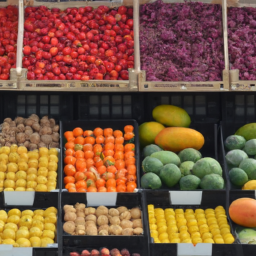- September 4, 2023
- Posted by: DBS
- Category: Business

If you are looking to venture into the foodstuff trading industry in Dubai Mainland, it is important to understand the necessary steps and procedures involved in starting your business. From business setup and company formation to registering with authorities and obtaining necessary permits, the process can seem overwhelming. In this article, we will guide you through the key considerations and provide valuable insights on how to successfully start a foodstuff trading business in Dubai Mainland. By following these steps, you will be well-equipped to navigate the regulatory landscape and establish a successful business in this thriving market.
How to Start a Foodstuff Trading Business in Dubai Mainland
Starting a foodstuff trading business in Dubai Mainland can be an exciting and profitable venture. However, it requires careful research, planning, and compliance with legal requirements. In this article, we will guide you through the step-by-step process of setting up your foodstuff trading business in Dubai Mainland, ensuring that you have all the necessary information to succeed.
1. Research and Planning
1.1 Market Research
Before starting any business, conducting thorough market research is crucial. Identify the demand for your products, study your target audience, and analyze your competitors. Determine the demand for different foodstuff items in Dubai and identify any gaps in the market that your business can fill. This research will help you understand your potential customers and tailor your offerings to meet their needs effectively.
1.2 Business Plan
Developing a comprehensive business plan is essential for the success of your foodstuff trading business. Your business plan should outline your goals, target market, marketing strategy, financial projections, and plans for expansion. It serves as a roadmap for your business and helps attract investors or secure funding from banks.
1.3 Legal Requirements
Before proceeding with company registration, it is crucial to understand the legal requirements for setting up a foodstuff trading business in Dubai Mainland. Familiarize yourself with the necessary licenses, permits, and regulations enforced by the relevant government authorities, such as the Department of Economic Development and Dubai Municipality. Compliance with these legal requirements is essential to operate legally and avoid penalties or business closure.
2. Company Registration
2.1 Choose a Business Name
Selecting an appropriate and unique business name that reflects your foodstuff trading business is an important first step. Ensure that the name complies with the naming conventions specified by the Department of Economic Development and does not infringe on any existing trademarks.
2.2 Determine Business Activity
Determine the specific activities your foodstuff trading business will engage in, as this will affect the license you need to obtain. Whether you plan to import, export, distribute, or retail foodstuff products, identifying your business activity is crucial for the registration process.
2.3 Obtain Necessary Licenses
To legally operate a foodstuff trading business in Dubai Mainland, you will need to obtain certain licenses. The specific licenses required may vary based on your business activity, but commonly required licenses include the Commercial License, Food Safety License, and Trade License. Consult with the Department of Economic Development or seek assistance from a professional business setup service provider to ensure that you obtain all the necessary licenses.
2.4 Register with the Department of Economic Development
Registering your foodstuff trading business with the Department of Economic Development is a mandatory step to operate legally in Dubai Mainland. Prepare all the required documents, such as your business plan, licenses, and identification documents, and submit them to the Department of Economic Development. Once your application is approved, you will receive your commercial license, allowing you to commence operations.
2.5 Hire a Local Sponsor
As a foreign investor, you will need a local sponsor or service agent to set up a foodstuff trading business in Dubai Mainland. The local sponsor must be a UAE national or a company wholly owned by UAE nationals. They will have a 51% share in the business, as required by the UAE Commercial Companies Law. It is crucial to establish a clear and transparent agreement with your local sponsor to protect your business interests.
3. Location and Premises
3.1 Determine Ideal Location
Choosing the right location for your foodstuff trading business is vital for success. Consider factors such as proximity to your target market, accessibility, and competition. Dubai Mainland offers diverse options for commercial spaces, including industrial areas, business parks, and retail zones. Research and select a location that aligns with your business requirements and attracts your target customers efficiently.
3.2 Find Suitable Premises
Once you have identified the ideal location, search for suitable premises for your foodstuff trading business. Ensure that the premises comply with all legal requirements and food safety regulations imposed by the Dubai Municipality. The premises should be equipped with the necessary facilities, such as proper storage areas, refrigeration units, and food preparation spaces, to ensure the safety and quality of your products.
4. Financial Resources and Funding
4.1 Calculate Startup Costs
Accurately estimating your startup costs is crucial for effective financial planning. Consider expenses such as licenses and permits, rent, utilities, inventory, equipment, marketing, and staff salaries. Develop a detailed financial plan that outlines your projected expenses and revenue streams, helping you understand the funding requirements for starting your foodstuff trading business.
4.2 Secure Funding
Once you have determined your startup costs, explore different funding options to secure the necessary capital. This can include personal savings, loans from banks or financial institutions, investment from partners, or contributions from shareholders. Present your business plan and financial projections to potential investors or lenders to demonstrate the profitability and viability of your foodstuff trading business.
5. Supply Chain Management
5.1 Source Suppliers
Establishing a reliable network of suppliers is essential for a successful foodstuff trading business. Research and identify reputable suppliers of quality foodstuff items that meet the demand of your target market. Establish strong relationships with your suppliers to ensure consistent availability, competitive prices, and timely deliveries.
5.2 Establish Relationships with Suppliers
Nurture good relationships with your suppliers to facilitate smooth business operations. Communicate your requirements clearly and consistently, negotiate pricing and credit terms, and ensure reliable delivery schedules. Building strong partnerships with suppliers will enable you to offer high-quality products to your customers consistently.
5.3 Ensure Quality Control
Maintaining food safety and quality standards is imperative for a foodstuff trading business. Implement quality control measures at every stage of the supply chain, from sourcing to storage and distribution. Regularly inspect your suppliers’ facilities and products, and establish stringent quality control protocols to mitigate any potential risks and ensure customer satisfaction.
6. Inventory Management
6.1 Determine Stock Levels
Efficient inventory management is crucial to minimize costs and maintain optimal stock levels. Analyze your sales data, monitor market trends, and consider seasonal fluctuations to determine the appropriate stock levels for each foodstuff item. Avoid overstocking to prevent wastage and loss, while ensuring you always have sufficient stock to meet customer demand.
6.2 Implement an Inventory System
Utilize an inventory management system to track and manage your stock effectively. Use software or technology solutions to automate inventory tracking, streamline order processing, and manage stock replenishments efficiently. This will help you maintain accurate stock records, minimize errors, and optimize your supply chain operations.
7. Marketing and Sales
7.1 Create a Brand Identity
Develop a strong brand identity that resonates with your target audience and differentiates your foodstuff trading business from competitors. Create a compelling brand name, logo, and tagline that reflect your business values and offerings. Establish a visual identity and consistent brand messaging to build trust and recognition among customers.
7.2 Develop a Marketing Strategy
Crafting a robust marketing strategy is crucial to promote your foodstuff trading business effectively. Identify your target audience and select suitable marketing channels, such as social media, online advertising, print media, or partnerships with local businesses. Develop engaging content, run targeted campaigns, and leverage digital marketing tools to reach and attract potential customers.
7.3 Build a Customer Base
Focus on building a loyal customer base for your foodstuff trading business. Offer exceptional customer service, maintain competitive pricing, and provide unique product offerings to attract and retain customers. Implement loyalty programs, discounts, or promotional events to incentivize repeat purchases and word-of-mouth referrals.
7.4 Establish Distribution Channels
Identify the most efficient distribution channels to reach your customers in Dubai Mainland. Establish relationships with supermarkets, grocery stores, hotels, restaurants, and online delivery platforms to expand your market reach. Ensure timely and efficient delivery of your products, and continuously assess the performance of your distribution channels to optimize your sales efforts.
8. Hiring and Training Employees
8.1 Determine Staffing Needs
Assess your business requirements to determine the number and types of employees needed for your foodstuff trading business. Roles may include sales representatives, warehouse staff, delivery personnel, administrative personnel, and finance professionals. Consider factors such as workload, business growth potential, and budget constraints to determine your optimal staffing needs.
8.2 Recruit and Hire Employees
Develop a recruitment strategy to attract suitable candidates for your foodstuff trading business. Advertise job vacancies on relevant platforms, conduct interviews, and assess candidates’ qualifications, experience, and cultural fit. Ensure that you comply with labor laws and employment regulations enforced by the UAE Ministry of Human Resources and Emiratisation.
8.3 Provide Training and Development
Invest in the training and development of your employees to enhance their skills and performance. Conduct thorough onboarding processes and provide ongoing training to improve product knowledge, customer service skills, and operational efficiency. Continuous employee development will contribute to a motivated and skilled workforce, leading to improved customer satisfaction and business growth.
9. Operations and Logistics
9.1 Manage Daily Operations
Establish efficient processes and workflows to manage the daily operations of your foodstuff trading business. Implement inventory tracking systems, streamline order processing, and ensure timely product deliveries. Monitor sales performance, manage cash flows, and regularly assess and improve operational efficiency to maximize profitability.
9.2 Establish Quality Control Measures
Maintain stringent quality control measures throughout your foodstuff trading business. Implement regular inspections and quality assurance protocols to ensure compliance with food safety regulations and maintain the freshness and quality of your products. Train your employees on proper handling and storage techniques, and enforce strict hygiene practices to protect your customers and your reputation.
9.3 Ensure Effective Logistics
Efficient logistics management is crucial for the success of your foodstuff trading business. Establish reliable transportation and delivery systems to ensure the timely and safe movement of your products. Track and monitor your logistics operations, optimize delivery routes, and establish contingency plans to mitigate any potential disruptions or delays.
10. Legal and Regulatory Compliance
10.1 Understand Food Safety Regulations
Compliance with food safety regulations is essential for a foodstuff trading business. Familiarize yourself with the food safety regulations and guidelines specified by the Dubai Municipality and other relevant authorities. Ensure proper storage, handling, and labeling of your foodstuff products to maintain the highest standards of food safety and protect the health and safety of your customers.
10.2 Comply with Trade License Requirements
Ensure that you renew your trade license on time to avoid any legal complications. Familiarize yourself with the renewal process, including necessary documentation, fees, and timelines. Complying with trade license requirements demonstrates your commitment to operating legally and protects your business from potential penalties or closures.
10.3 Register with Dubai Municipality
Registering your foodstuff trading business with the Dubai Municipality is mandatory to ensure compliance with food safety regulations. Consult with the Municipality to understand the specific requirements and procedures for registration. This registration will enable the Municipality to monitor and inspect your business operations regularly, ensuring that you maintain the highest standards of food safety and quality.
In conclusion, starting a foodstuff trading business in Dubai Mainland requires rigorous research, careful planning, and adherence to legal requirements. By following the steps outlined in this article, you can navigate the process successfully and establish a thriving foodstuff trading business in Dubai Mainland. Remember to seek professional assistance when necessary and continuously adapt to changing market trends to ensure long-term success.

